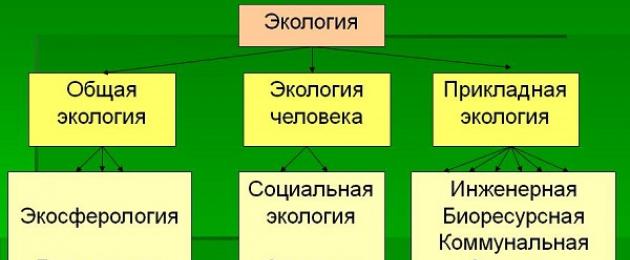The history of the ecologist profession began even before our era. Aristotle, Theophrastus, Pliny wrote the first treatises known to us in this area. But the world felt the urgent need for ecologists only now.
In the second half of the 20th century, the world community began to worry about the state of the planet. Man-made disasters, industrial revolutions, extraction of fossil resources - all this is reflected in the state of the environment.
Ecologists are needed in order to control the negative impact of man on the natural world.
Who is an environmental scientist and how to become one
An ecologist is a narrow-profile specialist who analyzes the situation and develops a set of measures to reduce environmental damage.

Ecologists can be divided into bioecologists, agroecologists, geoecologists, hydroecologists, environmental engineers, urban environmentalists, environmental technicians, laboratory environmentalists, inspectors and auditors. Some study animal world, others are vegetable, others analyze the state of cities, etc.
It is worth noting: sometimes it is not necessary to have a profile education as an ecologist to become one. It is enough to be a specialist in one of the areas: biology, physics, chemistry, agronomy, geology, ecology, etc.
Specialty "Ecology and nature management" - who and where you can work
Graduates of the specialty "Ecology and Nature Management" work not only in the office, but also on field trips to take samples. They are responsible for rationalizing the use natural resources.

There are several general employment options:
- In industry and construction. An environmental engineer is in demand from food production to oil and gas companies. He is engaged in the environmental safety of construction sites and controls the sanitary situation. Conducts expert examinations before the construction of buildings, factories, roads.
- in the medical field. An ecologist-laboratory assistant is needed for a forensic medical examination, which requires knowledge about the environment.
- in supervisory authorities. Work in state regulatory bodies, statistical committees. An environmental expert draws up a description of industrial zones, checks the accounts of enterprises.
- Consulting and environmental audit. The urban ecologist is a growing profession whose purpose is to design and control the ecological state of new cities.
Work in the environmental field without experience
Students of environmental universities receive all professional skills during summer practice, but they do not have the work experience that is needed to get hired by a private enterprise. The list of professions in this case is not extensive: work at a state enterprise or volunteering.

Take note: Ecolog International is recruiting volunteers to work abroad. Knowledge of English will be a big advantage.
Ecological volunteering is one of the ways to see the world, gain experience and not go broke. Organizers usually pay for accommodation and travel for volunteers.
Work at state enterprises is inferior to private ones in salary, but environmentalists are hired even without experience due to the low number of such at the labor exchange.
You have to understand that this is a stressful job. Especially if there was no ecologist at the enterprise before. It is difficult to explain to workers that production waste must be collected separately, and the disturbing tree cannot be cut down.
Where and how many years to study as an ecologist in Russia
You can also learn professions related to ecology with the help of courses, but to become a real specialist, you need to study at a specialized university.

The best universities are:
- Russian State University oil and gas named after I. M. Gubkin. Specialty "Geoecology", training period - 4 years. The Department of Geoecology also recruits for the Master's program (2 years).
- Lomonosov Moscow State University. Undergraduate " Rational nature management”, Faculty of Geography, the term of study is 4 years. Master's degree - 2 years.
- Faculty of Ecology at RUDN University offers two directions: "Energy and resource-saving processes in chemical technology, petrochemistry and biotechnology" and "Ecology and nature management". The term of study in the bachelor's degree is 4 years, the master's degree is 2 years.
Courses:
- Institute of Vocational Education. Programs and terms of study: "Environmental safety" (1 year), teacher of ecology (6 months).
- NRU " high school economy". Program and duration of training: "Environmental Protection" (2 weeks).
What items to take
To enter a university with a degree in ecology, you need to pass USE in mathematics, geography and Russian language.

Consider: items may vary depending on the ecologist's specialization. Some universities require the exam in biology, physics or chemistry, social science.
What is the salary of an ecologist in Moscow
On average, Moscow ecologists earn 41,000 rubles. Earnings vary from 20 to 80 thousand rubles.

It all depends on the position and organization. The oil industry is considered the most paid and prestigious place of work.
Career growth and development prospects
The young specialist starts his career as a technical assistant. After some time, he can become a coordinator, and then the curator of the project.

The career path is far from easy. It can take years of experience to earn a high position. Among other things, the staff turnover in the scientific field is very low. Many environmentalists work and remain in demand even after retirement.
Is it worth studying to be an ecologist - the pros and cons of the profession
Pros:
- Opportunity to work abroad, as the profession involves business trips.
- The demand for ecologists is just starting to grow. Every year, specialists in this field are more and more in demand in the labor market.
- A qualified environmentalist is needed in all highly paid areas: construction, oil production, energy.

Minuses:
- Low wages in government agencies.
- Dangerous working conditions. Often the job is to study the risk and further disposal of harmful substances.
An environmentalist (or environmental engineer) is engaged in identifying, studying and minimizing natural and human factors that negatively affect environment. He investigates any negative phenomena in nature, establishes their cause and methods for their prevention. Also, no construction begins without environmental expertise and its positive result.
Given the state of the atmosphere and nature in modern world, the importance of the ecologist profession is growing every year, as are the requirements put forward to the knowledge and experience of these specialists.
Places of work
The position of an ecologist is in demand in environmental and construction organizations, in the field of healthcare, municipal structures and large manufacturing enterprises.
Responsibilities of an ecologist
It is better to understand who such an ecologist will help the main official duties this specialist:
- Development of the environmental policy of the enterprise and control of its compliance.
- Preparation of environmental documentation necessary to support the activities of the enterprise.
- Interaction with environmental structures, including during inspections.
- Interaction with organizations that issue initial permits and coordinate project documentation.
- Organization of work at the enterprise in emergency situations or in the event of an accident at work.
- Advising company employees on environmental issues.

environmental requirements
The main requirements for the ecologist:
- Higher education.
- Knowledge of environmental legislation.
- Experience in environmental auditing.
- Knowledge of environmental monitoring methods.
- Experience in working with organizations that issue initial permits and coordinate project documentation.
- Knowledge of PC and computer environmental programs.
Also, given the possibility of business trips and exchange of experience with colleagues from other countries, an environmental engineer may need knowledge of written and spoken English for work.

environmentalist resume template
How to become an ecologist
A person can become an ecologist higher education in such areas as agronomy, agrochemistry, biology, geology, ecology and nature management. In addition, you need to get a postgraduate professional education, which includes postgraduate studies, doctoral studies and internships.
Profession risks
An ecologist periodically has to work with harmful substances that negatively affect his well-being and the body as a whole. In addition, it is possible to work in extreme conditions that undermine the efficiency and health of a specialist.
Environmentalist salary
The salary of an ecologist varies from 25 to 80 thousand rubles a month. In the presence of foreign business trips, the salary of this specialist may be higher than the specified amount. Project awards are also possible. The average salary of an ecologist is 50 thousand rubles a month.
XVII International Forum "Ecology of the big city-2017". Conducting a seminar "Hazardous waste management of the population: practice, problems and solutions"
Global climate change, recycling efficiency of industrial and household waste, severe pollution of soil and water, increasing gas pollution in cities ... Almost every one of us now knows about these topical problems.
Back in the second half of the 20th century, the danger of further deterioration of the environment led to the need to train qualified personnel.
Today, decades later, professional ecologists are called upon to protect the interests of nature and minimize the enormous damage that is constantly being done to our planet.
What does an ecologist do
Description of the ecologist professionI would like to start with her full name - environmental engineer.
In general, this profession is often idealized. Many people sincerely think that it consists in washing birds from oil products or rescuing seals that have washed ashore.
In fact, environmentalists have many different responsibilities, including:
- Development of environmental documentation, which contains information about the activities of the enterprise in accordance with environmental legislation.
- Permanent control over the activities of the enterprise. This is the implementation of regular internal audits designed to identify how the requirements of the current legislation and established standards are being observed.
- Completing profile reports.The specialist collects data on the amount of waste, discharges and emissions generated at the enterprise and transmits this information to the regulatory authorities.
- Advising employees on topical environmental issues. Educational work with the staff of the enterprise is one of the main activities of ecologists.
Where to get an education
In Russia, they are trained in many higher educational institutions, primarily in universities of technical and natural sciences. If you decide to devote yourself to this profession, then it is important to decide what exactly you are interested in. For example, a techie should turn their attention to environmental engineers and environmental protection specialists in the petrochemical and chemical industry. But the humanities will be closer to professions in the field of legislation, eco-tourism...
By the way, experienced specialists should improve their skills from time to time. To do this, they undergo thematic trainings, seminars and courses in specialized training centers. Moreover, there are full-time, part-time, distance and corporate forms of education.
Workdays of environmentalists

XII St. Petersburg International Book Salon 2017. Participant of the Salon
Description of the ecologist professionIt is impossible without a story about the main areas of work of these specialists:
- Environmental Engineermonitors compliance with environmental legislation at the enterprise.
- Environmental designer R develops special sections of projects. Its tasks include the quantitative calculation of all harmful effects from the enterprise. He works in design organizations.
- Environmental Auditorconducts ecological expertise for certification of the enterprise. His workplace is in audit companies.
- environmental inspectorcarries out environmental supervision over the activities of the enterprise. These professionals work in state structures ah - Committees for Nature Management, Rosprirodnadzor, Ministry of Natural Resources, etc.
My history
I received my higher education at the St. Petersburg Marine Technical University. Within a month after graduating from the university, I managed to get a job at a manufacturing enterprise that was engaged in the manufacture of hydroacoustic instruments. Then I moved to a design organization, as I wanted to acquire skills in working in special environmental programs and learn how to develop projects. Over time, the company's management noted me and approved me as the head of the environmental protection department.
It is interesting to note the experience of working in a foreign company. Here, the environment is a priority. The activities of such organizations are based on respect for nature, which, of course, inspires respect. Here I have becomedepartment for labor protection and environmental protection. Yes, in European companies these positions are combined.The remuneration of environmentalists for foreigners is 30-40% higher than for Russians. It's nice, of course.
It is good when specialists have the opportunity to attend various events dedicated to topical issues of environmental protection. Here and acquaintance with colleagues and like-minded people, and the exchange of experience. So, this year I remember the XVII International Forum "Ecology of the Big City" and the XII St. Petersburg International Book Fair.
Completing, I would like to note that the status and popularity of this specialty in the modern world is growing. Many call it the profession of the future. Indeed, the growth of technological progress has led to a large increase in the negative impact on the environment. And today we need to pay serious attention to environmental issues..
25.05.2016An ecologist is a specialist who analyzes the situation and develops measures to reduce harm to nature. A specialist in this profession identifies the causes of natural disasters and develops ways to reduce the impact of the human factor on the environment.
The salary of an ecologist varies from 30 to 80 thousand rubles a month. If there are foreign business trips, the salary of a specialist is higher than the specified amount. The average salary is 50 thousand rubles a month.
In the future, there will be more and more environmental problems. In connection with the growth of the emission of harmful elements into the atmosphere, environmental problems are put in one of the first places. Demand professional specialists will rise. The profession of an ecologist will become one of the most demanded and important not only in Russia, but also in the world.
Ecologists study the state of the earth, water, air, as well as the degree of impact of industrial production on people, plants, and animals. They identify the degree of pollution, analyze the causes and make a forecast of the situation in the future.
IN this moment Qualified ecologists are also needed to conduct expert reviews at the beginning of the construction of residential buildings, factories, transport road facilities. Without a positive conclusion, none of the construction projects will start work.
Environmental engineers, in turn, are involved in the development and approval of documents confirming the environmental safety of some projects and industrial production.
Thanks to the work of an ecologist, information is provided to society about the impact natural environment and food on people's health and well-being. For economic activity, information about the environmental hazard, its nature, degree and scale of the predicted consequences is important. An ecologist can work both in environmental organizations, in healthcare, and in educational institutions.UNIVERSITIES AND POINTS:
1. State University for Land Management. Faculty of Real Estate Cadastre.
USE: geography, Russian language, mathematics. Points for the budget - from 189.2. Moscow state institute international relations. Faculty of Applied Economics and Commerce.
Direction of training - "Ecology and nature management".
USE: geography, Russian language, foreign language. Points for the budget - 270.3. Lomonosov Moscow State University M.V. Lomonosov. Faculty of Geography.
Direction of training - "Ecology and nature management".
USE: geography, Russian language, mathematics, geography (in writing). Points for the budget - from 200.4. Russian State Agrarian University - Moscow Agricultural Academy. K.A. Timiryazev. Faculty of technosphere safety, ecology and nature management.
Direction of training - "Ecology and nature management".ST. PETERSBURG:
1. State Polar Academy, St. Petersburg.
Direction of training - "Ecology and nature management".
USE: geography, Russian language, mathematics. Points - from 165.2. National Mineral and Raw Materials University "Gorny".
USE: physics, Russian language, mathematics. Points - from 216.3. St. Petersburg State University of Architecture and Civil Engineering.
USE: physics, Russian language, mathematics. Points - from 210.NOVOSIBIRSK:
1. Novosibirsk State Academy water transport. Hydrotechnical faculty.
Direction of training - "Nature management and water use".
USE: chemistry, Russian language, mathematics. Points - from 150.2. Novosibirsk State Pedagogical University. Institute of natural and socio-economic sciences.
Direction of training - "Ecology and nature management".
USE: geography, Russian language, mathematics. Points for the budget - from 165.3. Siberian State Geodetic Academy. Institute of Cadastre and Nature Management.
Direction of training - "Ecology and nature management".
USE: geography, Russian language, mathematics. Points - from 195.EKATERINBURG:
1. Ural State Mining University. Institute of World Economy.
Direction of training - "Technosphere safety".
USE: physics, Russian language, mathematics. Points - from 165.2. Ural state forest Technical University. Institute of Chemical Processing of Vegetable Raw Materials and Industrial Ecology.
Direction of training - "Technosphere safety".
USE: chemistry, Russian language, mathematics. Points - from 156.3. Ural federal university them. B.N. Yeltsin.
Direction of training - "Ecology and nature management".
USE: geography, Russian language, mathematics. Points for the budget - from 210.PERSPECTIVES
Environmental graduates can start their careers in state structures (for example, in Rostekhnadzor, Rosprirodnadzor, the Federal Service for Hydrometeorology and Monitoring, etc.).
An environmental engineer specializes in the study and study of the environment, the analysis of the data obtained, and the proposal of measures to reduce harm to nature. The purpose of the ecologist's work is to identify the cause of the cataclysm and develop measures to prevent such a problem in the future.
Wage
RUB 40,000–60,000 (worka.yandex.ru)
Place of work
A specialist's career often begins with government structures, where it is easiest to learn the initial skills of the profession. These organizations include: Rostekhnadzor, Rosprirodnadzor, Federal Service for Hydrometeorology and Monitoring, Ministry Agriculture etc. Specialists also work in large companies that need a staff unit of an ecologist (manufacturing, construction companies, environmental protection companies, etc.).
Duties
An ecologist in a broad sense is engaged in the development of measures to reduce the negative impacts of man on nature. Why do lakes dry up? Why are forests and animals dying? Why is the climate changing? All these are global environmental issues. Specialist responsibilities include:
- Development and coordination of normative acts on environmental protection.
- Conducting research and examinations on the content of harmful substances in the air, water or soil.
- Preparation of preliminary conclusions on the area before carrying out construction work.
- Constant study of world experience in environmental management. Knowledge of ISO standards, their implementation in the enterprise.
Important qualities
In their work, ecologists often encounter violators that pollute the environment. To combat them, you need 100% self-righteousness, resistance to stress, internal discipline. An analytical mind, passion for nature, accuracy and attentiveness will not interfere.
Reviews about the profession
“Training for this profession should be continuous: begin at kindergarten, continue in school and then in higher educational institution. Understanding environmental issues is as important as studying the history of your country. And you need practice. It is impossible to deal with ecology while sitting in the classroom. We need to study it in natural ecosystems, in man-made landscapes, where you can clearly see how and what a person does with the environment.”
Svetlana Litvinskaya, ecologist.
stereotypes, humor
The main and justified stereotype about the profession is a threat to health due to the need to work in extreme conditions, as well as frequent handling of chemicals. However, the result of the work is the correction of the situation, which cannot but lead to moral satisfaction.
Education
To obtain the position of an environmental engineer, a higher specialized education is required. Many universities provide an opportunity to get a specialty in this field. Secondary specialized education, as well as courses, is not enough. You can study at such universities as: St. Petersburg State University, Russian State Hydrometeorological University.
Environmental universities in Moscow: Russian State Social University, Moscow State University named after M. V. Lomonosov, Moscow State Technical University named after N. E. Bauman, Russian University of Chemical Technology named after D. I. Mendeleev.
- In contact with 0
- Google+ 0
- OK 0
- Facebook 0








